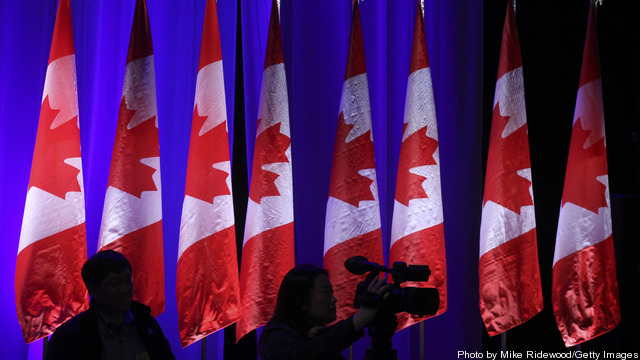
On her way from Washington DC to Ottowa, Alberta Premier Alison Redford stopped by the Canadian consulate in New York City on Tuesday to tell her side of the Keystone XL pipeline story.
She said she has no sense of the time line for Keystone XL and had no comment on the internal American regulatory process.
“My job is to represent the best interests of the people of Alberta,” she said. The proposed pipeline has become a “PR war,” Redford said and one that she said she is not willing to engage in.
A project of TransCanada, the Keystone XL pipeline was intended to travel 1,700-kilometers from Alberta’s oil sands to the Gulf Coast in Texas to transport 700,000 barrels of oil a day. Much of the pipeline is already lying on the ground in North Dakota, waiting to be constructed.
But vehement opposition from various US environmental groups and the governor of Nebraska–under which the pipeline was intended to travel–has led President Obama to delay a decision on the project till after the presidential election. Meanwhile, TransCanada decided on Tuesday to offer a new route for the pipeline that would avoid the Nebraska Sand Hills and the Ogallala Aquifer which rest there and provides fresh water for local agriculture and for millions in the area.
Redford said she is confident the environmental issues can be dealt with appropriately but she fears that there is deeper opposition to the project lying behind the arguments.
She said: “Once the environmental issues are dealt with, what’s next? What are the real views of the opponents?”
Communication Problems
Redford said Alberta failed in part to get its message out to the American public. The region has been focusing on responding to attacks instead of communicating its energy and environmental policies, which include much more than oil sands development.
“We need to take a proactive role in the discussion,” she said. Alberta will begin working more closely with Washington think tanks, programs and and panels to have its message communicated to the public, not just by politicians but by academics and scientists as well, she said.
She said Alberta has invested $2 billion in carbon capture technologies, has a significant hydro power portfolio and is developing a broad range of other energy resources.
Redford said she hoped Canada, the United States and Mexico could come together to formulate a long-term economically and environmentally viable energy plan for the hemisphere.
But if the US does not ultimately approve the Keystone XL pipeline, Canada may begin to look more seriously at other buyers for its vast tar sands. Calgary-based Enbridge has proposed another pipeline, Northern Gateway, that would cost about $5.5 billion to construct and would bring 525,000 barrels of oil a day to Kitimat, British Columbia. From there, the oil could be shipped to Asian markets.
From New York, Redford said she planned to travel to Ottowa to meet with Canadian Prime Minister Stephen Harper. The two will have a broad-ranging discussion on Alberta’s and Canada’s long-term energy policies. She said the two will discuss “what we can do with these resources that’s in Canada’s best interest.”
Will the Keystone XL pipeline be built?
“This is something Americans need to decide,” she said.
